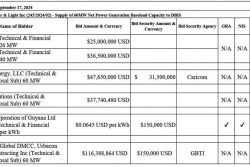Dear Editor,
I read with considerable concern, coupled with mild amusement, some cacophonous utterances allegedly issuing from three high officials of the administration whose troubled demeanours spread across the printed media were unwittingly calculated to elicit utter distress from a bewildered citizenry. For whereas the Chief-of-Staff was disposed to mobilise his forces to “define” aggression, the honourable Minister of State was disposed to inform and sensitise Guyanese about disturbing movements by Venezuela on our eastern border by way of an appropriate “defence”, the Minister responsible for Governance and Natural Resources was inclined to make a fatuous distinction between a show of force, the threat of force and the use of force.
In the meantime, no clearer definition of aggression could have been discerned than the illegal occupation and militarisation of Guyana’s half of Ankoko Island located in the Cuyuni River and the alleged deployment of gunboats in the said river by the Venezuelan military commander.
Some four decades ago, I had the honour of representing Guyana on the United Nations Committee on Defining Aggression, a mandate inherited from the League of Nations which had valiantly but unsuccessfully wrestled with the issue of defining aggression and which the United Nations inherited and has been unable to resolve definitively and conclusively despite the elaboration of the Declaration on the Definition of Aggression (GA Resolution 3314 XXIX) 1974 and Article 5 of the Rome Treaty Establishing the International Criminal Court (1998).
What our Chief-of-Staff may usefully occupy himself in doing is to establish and bring to the attention of the current administration acts of military aggression on the part of Venezuela in respect of Guyana’s land territory and maritime space. If, as alleged by our Chief-of-Staff, the Cuyuni River is wholly within Guyana’s territorial space and armed vessels have been deployed by Venezuela therein, a blatant commission of aggression, undeserving of definition, has clearly been committed thereby entitling the Guyana Defence Force to repel the aggressor. Our Commander-in-Chief need not be concerned in these circumstances with the commission of aggression by our soldiers unless the response to the Venezuelan initiative is indisputably disproportionate.
One plausible interpretation of current events is a strategy being employed by Venezuela to intimidate the Guyana Head of Government into engaging in a one-on-one negotiating meeting prior to his firm rejection of Venezuela’s ambitions in his speech to the United Nations General As-sembly on Tuesday.
In the premises, what appears to be required is an approach to the Sec-retary-General of the United Nations, in whose court the ball has now been firmly located, to invoke Article 99 of the Charter to bring the aggressive acts of Venezuela, which undeniably threaten international peace and security, to the attention of the Security Council with an invitation for that body to secure from the International Court of Justice an Advisory Opinion on the current controversy between Venezuela and Guyana. This having been said, our honourable Attorney General may be left undisturbed to focus on other important juridical issues and our Chief-of-Staff on efficacious military initiatives.
Yours faithfully,
Professor Justice Duke Pollard
Department of Law
University of Guyana




